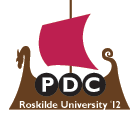| EXPL PAPERS | THURSDAY 11:00-11:45 | SMALL AUDITORIUM |
Health II
Session chair: Claus Bossen, Aarhus University
User participation in implementation
Benedicte Fleron, Roskilde University
Rasmus Rasmussen, Roskilde University
Jesper Simonsen, Roskilde University
Morten Hertzum, Roskilde University
Abstract. Systems development has been claimed to benefit from user participation, yet user participation in implementation activities may be more common and is a growing focus of participatory design work. We investigate the effect of the extensive user participation in the implementation of a clinical system by empirically analyzing how management, participating staff, and non-participating staff view the implementation process with respect to areas that have previously been linked to user participation such as system quality, emergent interactions, and psychological buy-in. The participating staff experienced more uncertainty and frustration than management and non-participating staff, especially concerning how to run an implementation process and how to understand and utilize the configuration possibilities of the system. This suggests that user participation in implementation introduces a need for new competences. Our results also emphasize the importance of access to fellow colleagues with relevant experience in implementing systems.
Towards an "empowered" user role in the design of large-scale electronic patient records
Line Silsand, Norwegian Centre for Telemedicine
Bente Christensen, Norwegian Centre for Telemedicine
Gunnar
Ellingsen, University of Tromsø
Abstract. We report from a large-scale Electronic Patient Record (EPR) project in Northern Norway where the goal is to design a new type of configurable EPRs that allow users in hospitals to tailor the software to their specific needs. This ability appears to challenge the traditional user role as what we usually understand as ordinary users increasingly undertake a designer role, hence dissolving the boundaries between users and designers. Still, the configurability of the software is not straightforward as it is not obvious who is going to decide how the final design should look like, how much tailoring should be possible and in which situations.
Real-use evaluation of effects: Emergency departments aiming for 'warm hands'
Jesper Simonsen, Roskilde University
Morten Hertzum, Roskilde University
Abstract. Embracing real use in an iterative approach calls for systematic formative evaluation. Effects-driven IT Development has been suggested as a way of supporting a Participatory Design (PD) process involving implementations that expose mature prototypes to real work practices. This is followed by evaluations of how specified and desired effects are obtained. We present results from a project where high-level political goals (‘More Warm Hands’; i.e., clinicians spending more time at the patient bedside) are aligned with the local clinical organization and practice. We demonstrate how to combine quantitative and qualitative methods to address various levels of ‘use’ from overall politics to actual practice. The project concerns the introduction and use of an electronic whiteboard system to support clinical overview and logistics at emergency departments (EDs). The nurses succeed in getting ‘warmer hands’ while the physicians have good reasons for not pursuing this aim after all. The study contributes to a growing bulk of literature on how to include PD in the later stages of iterative development.
